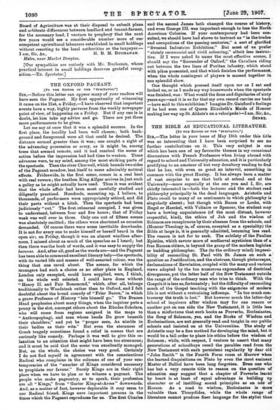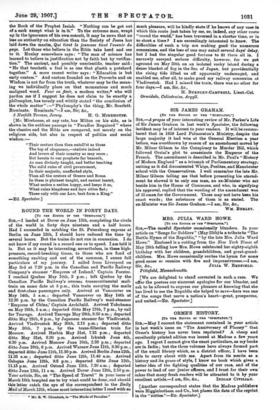THE BIBLE AS EDUCATIONAL LITERATURE.
(TO Toe EDITOR OF TIES "SPECTATOIE.”.1
SIR,—The letter in your issue of May 18th under this title was so interesting that I have been surprised to see no further contributions on it. This very subject is one which has been one of my favourite themes in my occasional discussions with French Profesaors when living abroad with regard to school and University education, and it is particularly gratifying to an amateur of but very desultory reading to find that he has, with even so great an interval, something in common with the great Huxley. It has always been a matter of vast surprise to me that both at school and at the University—more especially at the one you and I, Sir, are chiefly interested in—both the lecturer and the student read philosophy principally in the dead languages. Aristotle and Plato recall to many of us sentiments in which philosophy is singularly absent ; but though with Bacon or Locke, with Hegel or Haeckel, with Voltaire or Spencer, the etudent may have a bowing acquaintance (of the most distant, however respectful, kind), the ethics of Job and the wisdom of Solomon are conspicuous by their absence from the schools, and (Honour Theology is, of course, excepted as a speciality) the Bible at large is, it is generally admitted, becoming less read. The reason is not far to seek. The subtlety of the Pauline Epistles, which savour more of mediaeval mysticism than of a free Roman citizen, is beyond the grasp of the modern logician or budding philosopher. The (to the ordinary mind) impossi- bility of reconciling St. Paul with St. James on such a question as Justification, and the abstruse, though picturesque, declamations of Revelation, coupled with the many and various views adopted by the too numerous expounders of doctrinal divergences, put the latter half of the New Testament Outside the range of the ordinary man who tries to think. With the Gospels it is less so, fortunately ; but the difficulty of reconciling much of the Gospel teaching with the exigencies of modern life is not without a restraining influenge. "In too much con- troversy the truth is lost." But however much the latter-day school of inquirers after wisdom may for one reason or another put oh one side the New Testament, it is little less than a misfortune that such books as Proverbs, Ecclesiastes, the Song of Solomon, yes, and the Books of Wisdom and Ecclesiasticus, are not generally read and taught in our public schools and insisted on at the Universities. The study of Aristotle may be a fine method for developing the mind, but it would be a tall order to place his ethics before the wisdom of Solomon; while, with reaped, I venture to assert that many generations of schoolboys recall the parables read from the New Testament with such persistent regularity by dear old "John Smith" in the Fourth Form room at Harrow when the learned disquisitions on Plato by even the most eminent - Master of Balliol have been long forgotten. Even one who has but a very remote title to reason on the question of education may suggest that a chapter of Proverbs learnt by heart is at least of equal advantage in building up character or of instilling sound principles as an ode of Horace. As a road to wisdom, Ecclesiastes is more valuable than Thucydides, while the whole range of literature cannot produce finer language for the stylist than
the Book of the Prophet Isaiah. "Nothing can be got out of a sack except what is in it." To the extreme man, errapt npin the ignorance of his own conceit, it may be news that no lees an authority on education than the Society of Jesus hat laid down the maxim, Qui heat la jeunesse tient l'avenir du pays. Let those who believe in the Bible take heed and see to it. Huxley somewhere says "The man of science hat learned to believe in justification not by faith but by verifica- tion." The ancient, and possibly unscientific, teacher said : "He that teacheth a fool is as one that glueth a potsherd together." A more recent writer says "Education is but early custom." And custom founded on the Proverbs and on Wisdom is not far from the truth, whatever may be the mean- ing we individually place on that momentous and much maligned word. Pour en flair, a modern writer,* who will pardon me if I suggest he does not claim to be exactly a philosopher, has tersely and wittily stated " the conclusion of the whole matter" :—" Phylosophy's the thing, Mr. Scarlett. Ruminate. Rutnitate."—I am, Sir; dm,
[Mr. Mirellouse, at any rate, has Milton on his side, as is shown in the sublime passage in "Paradise Regained" where the classics and the Bible are compared, not merely on the religious side, but also in respect of politics and social wisdom "Their orators thou then extolrst as those
The top of eloquence,—statists indeed And lovers of their country as may seem ; But herein to our prophets far beneath, As men divinely taught, and better teaching The solid rules of civil government, In their majestic, unaffected style,
Than all the orators of Greece and Rome. In them is plainest taught, and easiest learnt, What makes a nation happy, and keeps it so, What ruins kingdoms and lays cities fiat; These only with our Law, best form a ring."
.—Ed. Spectator.]

















































 Previous page
Previous page